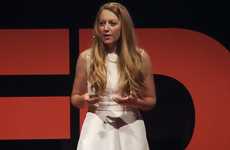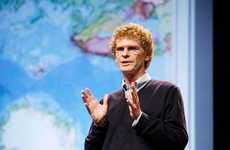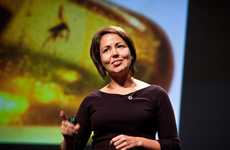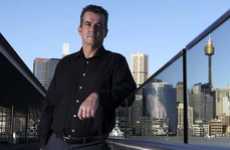
Sarah Red-Laird Keynotes
The Sarah Red-Laird talks on honey bees share the speaker's personal experience about how she became...

Need Inspiration?
Get inspired by 4,000+ keynote speaker videos & our founder, a top keynote speaker on innovation.
Sarah Red-Laird's Honey Bee Talk Discusses Why We're Losing So Many Bees
Alyson Wyers — June 21, 2014 — Keynote Trends
References: beegirl.org & youtu.be
In her honey bee talk, Sarah Red-Laird discusses how she was born a beekeeper, and how we are killing the bees. She begins by sharing her personal experience and love of honey bees before offering some interesting facts. For example, bee venom is actually used to destroy HIV cells.
On a more serious note, the speaker explains how one out of every three bites humans eat are pollenated by honey bees. This is problematic because this is the historically the hardest time to keep bees alive and healthy. While some news outlets might describe bee extinction as the result of a mystery malady, the honey bee talk explains how it is due to the Varroa destructor, monocropping, climate change and habitat loss. Red-Laird is most concerned with habitat loss because it magnifies makes every other issue.
She notes since 2006, just in North and South Dakota and Nebraska, we've lost 1.5 million acres of honey bee forage. While there has been an upswell of backyard beekeepers, the urban farming movement benefits but doesn't provide a sustainable solution for the planet. The speaker does believe a sustainable bee-friendly agriculture is possible.
On a more serious note, the speaker explains how one out of every three bites humans eat are pollenated by honey bees. This is problematic because this is the historically the hardest time to keep bees alive and healthy. While some news outlets might describe bee extinction as the result of a mystery malady, the honey bee talk explains how it is due to the Varroa destructor, monocropping, climate change and habitat loss. Red-Laird is most concerned with habitat loss because it magnifies makes every other issue.
She notes since 2006, just in North and South Dakota and Nebraska, we've lost 1.5 million acres of honey bee forage. While there has been an upswell of backyard beekeepers, the urban farming movement benefits but doesn't provide a sustainable solution for the planet. The speaker does believe a sustainable bee-friendly agriculture is possible.
2.3
Score
Popularity
Activity
Freshness
















